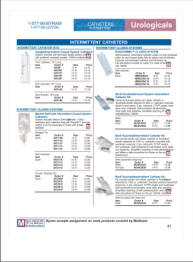|
If Medicare determines there is medical necessity, urological supplies are covered according to the standard allowables (which are available in your urology handouts). Medicare covers indwelling catheters, intermittent catheters and accessories (such as leg bags and bedside drainage bags). Medicare has recently changed their coverage rules for sterile intermittent catheters. Whereas they used to pay for only four per month, they now will cover one new sterile intermittent catheter per covered episode of catheterization.
Medicare Coverage Rules (Partial Overview): Letís take a look at the Medicare coverage guidelines for urologicals: Urinary catheters and external urinary collection devices are covered, if the need is documented. There also needs to be a permanent impairment of urination, and the usual Medicare stipulations have been met. And, as with other medical supplies, if the catheter or the external urinary collection device meet the coverage criteria, then the related supplies necessary for their effective use are also covered. The key for coverage is that the use of urological supplies for the treatment of a chronic urinary tract infection or other bladder condition must be accompanied by permanent urinary incontinence or retention, demonstrating that the patient's urinary system is not functioning. Details about this are in your urology handout. Urological supplies used for purposes not related to the covered use of catheters or external urinary collection devices (therefore, drainage and/or collection of urine from the bladder) will be denied as non-covered. Medical necessity requires that the patient must have a permanent impairment of urination. This does not require a determination that there is no possibility of the patient's condition improving sometime in the future, however. If the medical record, including the judgment of the attending physician, indicates the condition is of a long and indefinite duration (ordinarily at least 3 months), the test of permanence is considered met. Supplies in quantities above those specified as Medicare allowable must be requested by the physician and documented in the patientís medical record (and included in the claim to Medicare). |



 In
most states Medicaid will cover disposable diapers, pads,
liners, and external condom catheter systems.
In
most states Medicaid will cover disposable diapers, pads,
liners, and external condom catheter systems.